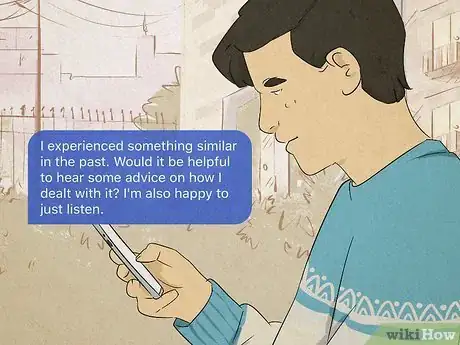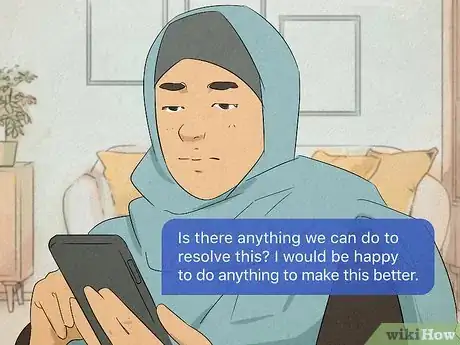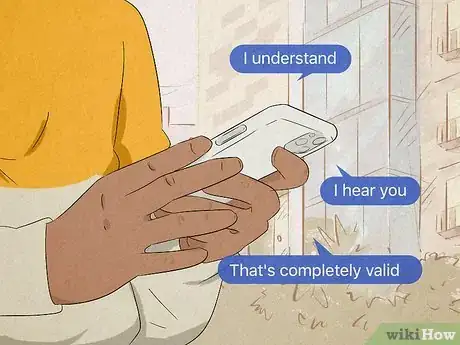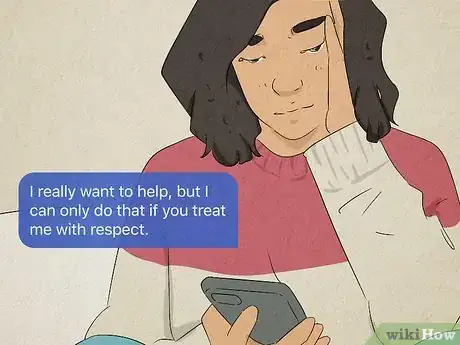This article was co-authored by Frank Blaney and by wikiHow staff writer, Madeleine Criglow. Frank Blaney is a Certified Qigong and Tai Chi Instructor with over 15 years of teaching experience. Passionate about making Qigong more accessible to people, Frank is the author of "Qigong: The Quick & Easy Start-Up Guide." He also holds a 2nd Degree Black Belt in Jujitsu and trains executives and staff of corporations, NGOs, and communities in self-care, personal performance and conflict resolution. He holds an MA in Negotiation, Conflict Resolution, and Peacebuilding from California State University Dominguez Hills.
There are 10 references cited in this article, which can be found at the bottom of the page.
This article has been viewed 57,743 times.
Dealing with an angry loved one over text is no easy feat. Whether they're upset at you or they just need to vent, it can be difficult to know how to help someone you care about when you're not speaking face to face. Thankfully, there are a lot of effective ways to defuse a person's anger over text. From being extra mindful of your word choice to crafting a meaningful apology, read on for some tips.
Things You Should Know
- Try to validate them in an empathetic and kind way so that they know you’re on their side.
- Ask plenty of follow-up questions to get a full picture of what’s going on.
- Don’t offer unsolicited advice; before you give any tips or suggestions, ask them if they’re open to it.
- Meet them in person or call them to avoid any tonal misunderstandings.
Steps
Expert Q&A
-
QuestionHow do you comfort an angry person over text?
 Frank BlaneyFrank Blaney is a Certified Qigong and Tai Chi Instructor with over 15 years of teaching experience. Passionate about making Qigong more accessible to people, Frank is the author of "Qigong: The Quick & Easy Start-Up Guide." He also holds a 2nd Degree Black Belt in Jujitsu and trains executives and staff of corporations, NGOs, and communities in self-care, personal performance and conflict resolution. He holds an MA in Negotiation, Conflict Resolution, and Peacebuilding from California State University Dominguez Hills.
Frank BlaneyFrank Blaney is a Certified Qigong and Tai Chi Instructor with over 15 years of teaching experience. Passionate about making Qigong more accessible to people, Frank is the author of "Qigong: The Quick & Easy Start-Up Guide." He also holds a 2nd Degree Black Belt in Jujitsu and trains executives and staff of corporations, NGOs, and communities in self-care, personal performance and conflict resolution. He holds an MA in Negotiation, Conflict Resolution, and Peacebuilding from California State University Dominguez Hills.
Certified Tai Chi & Qigong Instructor One question that is usually super useful is, "Will you remember this incident in five years?" Ask the other person that and they'll probably realize that the situation is not that important. Usually, all you need to do is to offer another perspective.
One question that is usually super useful is, "Will you remember this incident in five years?" Ask the other person that and they'll probably realize that the situation is not that important. Usually, all you need to do is to offer another perspective. -
QuestionWhat not to say to someone who is stressed?
 Frank BlaneyFrank Blaney is a Certified Qigong and Tai Chi Instructor with over 15 years of teaching experience. Passionate about making Qigong more accessible to people, Frank is the author of "Qigong: The Quick & Easy Start-Up Guide." He also holds a 2nd Degree Black Belt in Jujitsu and trains executives and staff of corporations, NGOs, and communities in self-care, personal performance and conflict resolution. He holds an MA in Negotiation, Conflict Resolution, and Peacebuilding from California State University Dominguez Hills.
Frank BlaneyFrank Blaney is a Certified Qigong and Tai Chi Instructor with over 15 years of teaching experience. Passionate about making Qigong more accessible to people, Frank is the author of "Qigong: The Quick & Easy Start-Up Guide." He also holds a 2nd Degree Black Belt in Jujitsu and trains executives and staff of corporations, NGOs, and communities in self-care, personal performance and conflict resolution. He holds an MA in Negotiation, Conflict Resolution, and Peacebuilding from California State University Dominguez Hills.
Certified Tai Chi & Qigong Instructor Whatever you do, do not blow the person off or say that they are overreacting. That's actually counterproductive and it's going to make them even more upset.
Whatever you do, do not blow the person off or say that they are overreacting. That's actually counterproductive and it's going to make them even more upset. -
QuestionHow do you calm down a stressed person?
 Frank BlaneyFrank Blaney is a Certified Qigong and Tai Chi Instructor with over 15 years of teaching experience. Passionate about making Qigong more accessible to people, Frank is the author of "Qigong: The Quick & Easy Start-Up Guide." He also holds a 2nd Degree Black Belt in Jujitsu and trains executives and staff of corporations, NGOs, and communities in self-care, personal performance and conflict resolution. He holds an MA in Negotiation, Conflict Resolution, and Peacebuilding from California State University Dominguez Hills.
Frank BlaneyFrank Blaney is a Certified Qigong and Tai Chi Instructor with over 15 years of teaching experience. Passionate about making Qigong more accessible to people, Frank is the author of "Qigong: The Quick & Easy Start-Up Guide." He also holds a 2nd Degree Black Belt in Jujitsu and trains executives and staff of corporations, NGOs, and communities in self-care, personal performance and conflict resolution. He holds an MA in Negotiation, Conflict Resolution, and Peacebuilding from California State University Dominguez Hills.
Certified Tai Chi & Qigong Instructor Try telling them that you understand that the situation is upsetting and asking to stop for a second and take five deep breaths just to get a hold of their emotions. Remember to ask them to not let the emotions control the situation.
Try telling them that you understand that the situation is upsetting and asking to stop for a second and take five deep breaths just to get a hold of their emotions. Remember to ask them to not let the emotions control the situation.
References
- ↑ Frank Blaney. Certified Tai Chi & Qigong Instructor. Expert Interview. 28 September 2021.
- ↑ https://www.mind.org.uk/information-support/types-of-mental-health-problems/anger/for-friends-and-family/
- ↑ Frank Blaney. Certified Tai Chi & Qigong Instructor. Expert Interview. 28 September 2021.
- ↑ https://au.reachout.com/articles/when-someone-is-always-angry
- ↑ https://www.psychologytoday.com/us/blog/healing-together/201912/how-help-someone-you-love-calm-down
- ↑ https://au.reachout.com/articles/when-someone-is-always-angry
- ↑ https://www.helpguide.org/articles/relationships-communication/conflict-resolution-skills.htm
- ↑ https://greatergood.berkeley.edu/article/item/six_tips_for_reading_emotions_in_text_messages
- ↑ https://greatergood.berkeley.edu/article/item/six_tips_for_reading_emotions_in_text_messages
- ↑ https://greatergood.berkeley.edu/article/item/six_tips_for_reading_emotions_in_text_messages
- ↑ Frank Blaney. Certified Tai Chi & Qigong Instructor. Expert Interview. 28 September 2021.
- ↑ https://www.npr.org/2020/09/05/909969004/before-texting-your-kid-make-sure-to-double-check-your-punctuation
- ↑ https://www.nytimes.com/2019/03/19/magazine/how-to-use-emojis.html
- ↑ https://psychcentral.com/blog/how-to-switch-off-an-angry-person
- ↑ https://www.psychologytoday.com/us/blog/healing-together/201912/how-help-someone-you-love-calm-down
- ↑ https://www.glamour.com/story/phone-empathy-isolation






































































